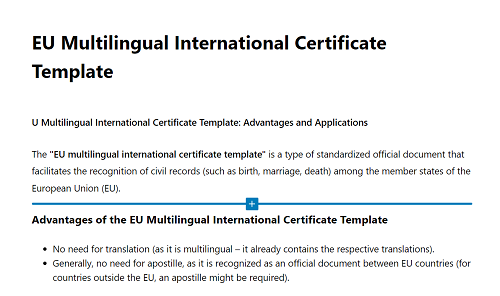EU Multilingual International Certificate Template: Advantages and Applications
The “EU multilingual international certificate template” is a type of standardized official document that facilitates the recognition of civil records (such as birth, marriage, death) among the member states of the European Union (EU).
Advantages of the EU Multilingual International Certificate Template
- No need for translation (as it is multilingual – it already contains the respective translations).
- Generally, no need for apostille, as it is recognized as an official document between EU countries (for countries outside the EU, an apostille might be required).
These certificates are created according to models established by international conventions, such as the 1976 Vienna Convention, and are available in multiple languages, helping eliminate language barriers and simplifying cross-border bureaucracy.
We issue the EU multilingual international certificate template and send it to any country by mail. Contact us!
Apostille
Technically, the EU multilingual international certificate template does not require an apostille. However, there are reports that some public service desk workers are unaware of this fact and mistakenly demand an apostille. To avoid inconvenience, many people prefer to apostille.
Application Example
If a Portuguese citizen needs to present their birth certificate in Germany, they can use the multilingual version issued by Portugal. This certificate will be automatically recognized by German authorities, eliminating the need for an apostille.
Main Features
Multilingualism
The certificates are issued in several languages (English, French, Spanish, Portuguese, etc.), typically including all official EU languages. This facilitates the understanding and acceptance of the document in any member country without the need for an official translation.
Standardized Models
There are specific models for different types of certificates, such as birth, marriage, and death. These models follow a uniform format, established by EU legislation, ensuring consistency and acceptance across member states.
Administrative Simplification
These certificates simplify administrative processes such as marriage registration, citizenship application, or diploma validation, as they are automatically recognized in all EU member states.
International Application
Although designed to facilitate the movement of people and documents within the EU, these certificates can also be useful in countries outside the EU that recognize the convention or have bilateral agreements with EU countries.
Use and Benefits
Legal Recognition
Facilitates the legal recognition of personal and family documents in different countries.
Cost Reduction
Reduces the need for certified translations and additional legalizations, thus lowering costs for citizens.
Agility
Speeds up administrative processes, such as moving residence, school, and university enrollments, and other public services.
Birth Certificate
A birth certificate issued in the international (multilingual) model will contain all relevant information in all the languages listed above, allowing authorities in any EU member country to understand and accept the document without the need for additional translation.
Marriage Certificate
Similarly, a marriage certificate issued in the international (multilingual) model will be understandable to any authority or institution within the EU.
Practical Example
If a Portuguese citizen needs to register their child’s birth in Germany, they can use the multilingual international birth certificate. This document will be directly recognized by German authorities, without the need for official translation or additional legalization procedures.
Benefits
Recognition Without Translation
The main advantage is that these certificates are automatically recognized in any EU country without the need for official translation, saving time and resources for citizens.
Ease of Use
These certificates are particularly useful for citizens living, working, or conducting business in more than one EU country, facilitating cross-border administrative processes.
Adriano Martins Pinheiro, lawyer in Portugal

Common Languages Included:
- German (Deutsch)
- Bulgarian (Български)
- Croatian (Hrvatski)
- Danish (Dansk)
- Slovak (Slovenčina)
- Slovenian (Slovenščina)
- Spanish (Español)
- Estonian (Eesti)
- Finnish (Suomi)
- French (Français)
- Greek (Ελληνικά)
- Hungarian (Magyar)
- English (English)
- Irish (Gaeilge)
- Italian (Italiano)
- Latvian (Latviešu)
- Lithuanian (Lietuvių)
- Maltese (Malti)
- Dutch (Nederlands)
- Polish (Polski)
- Portuguese (Português)
- Romanian (Română)
- Swedish (Svenska)
Reference Sources:
1976 Vienna Convention on the Issuance of Multilingual Extracts from Civil Status Records
Foreigners and Borders Service (SEF), Portugal
Europa Portal
1976 Vienna Convention
Europa Portal – Civil Certificates and Documentation.